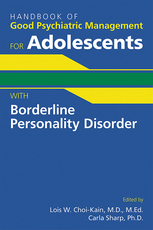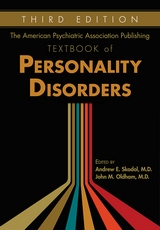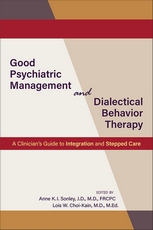Depression and Personality
Conceptual and Clinical Challenges
View Pricing
Description
Depression and Personality: Conceptual and Clinical Challenges offers an intriguing new look at where we are in understanding the relationship between personality dimensions, disorders, and mood disorder. It is both a cogent update of conceptual models and a clearly written, practical guide to the challenges faced every day by clinicians as they treat patients with depression and bipolar disorder.
Laying the groundwork for subsequent chapters, the editors emphasize the value of not only robust pharmacotherapy augmented by psychosocial interventions (with a focus on the assets rather than the liabilities of a patient's temperament), but also of a detailed review of where we are today.
An introductory overview provides valuable historical perspective on the evolution of personality from humors to body constitution and temperament. In 10 informative chapters, 22 contributors discuss
- The neurobiological dimensions of personality, focusing on affect-related traits as they review the evidence for serotonin and norepinephrine disturbance based on challenge paradigms, and the range of models to understand the interrelationship between personality and depression.
- The justification for depressive personality in both categorical terms, i.e., adding to the diagnostic armamentarium of DSM-V, and dimensional terms, focusing on the Five Factor Model to provide a link between several facets of neuroticism and depressive personality disorder.
- The impact of personality on various aspects of treatment, filling in a gap in the pharmacotherapy literature by asserting that personality pathology can affect the patient's capacity to seek, be engaged in, or be compliant with treatment.
- Key assessment and treatment issues, recommending a multimodal phased treatment approach that involves targeted pharmacotherapy and integrated individual psychotherapy.
- The role of personality disorder in the assessment and treatment of chronic depression, with a concise, practical overview of medication and psychotherapy issues regarding the role of Axis II disorders, and the complex relationship between bipolar disorder and personality factors.
- The complexity involved in adolescent depression with personality disorder, providing a conceptual framework for understanding what factors of personality contribute to vulnerability for depression in adolescents, and depression in later life, including particularly relevant issues such as the role of physical illness and organic factors on the clinical presentation of personality and affective disorder
Invaluable reading for clinicians and researchers alike, Depression and Personality: Conceptual and Clinical Challenges offers fascinating perspectives on the historical antecedents, neurobiological dimensions, and conceptual models regarding the relationship between personality and depression.
Contents
- CONTRIBUTORS
- PREFACE
- INTRODUCTION
- PART I: CONCEPTUAL ISSUES
- Chapter 1. PERSONALITY AND TEMPERAMENT: HISTORICAL PERSPECTIVES
- Chapter 2. THE PSYCHOBIOLOGY OF PERSONALITY DISORDERS
- Chapter 3. PERSONALITY TRAITS/DISORDERS AND DEPRESSION: A SUMMARY OF CONCEPTUAL AND EMPIRICAL FINDINGS
- Chapter 4. THE DEPRESSIVE PERSONALITY: PSYCHOPATHOLOGY, ASSESSMENT, AND TREATMENT
- PART II: TREATMENT IMPLICATIONS
- Chapter 5. THE IMPACT OF PERSONALITY ON THE PHARMACOLOGICAL TREATMENT OF DEPRESSION
- Chapter 6. CLINICAL STRATEGIES FOR EFFICIENT TREATMENT OF MAJOR DEPRESSIVE DISORDER COMPLICATED BY PERSONALITY DISORDER
- Chapter 7. REFRACTORY AND CHRONIC DEPRESSION: THE ROLE OF AXIS II DISORDERS IN ASSESSMENT AND TREATMENT
- Chapter 8. BIPOLAR DISORDER AND PERSONALITY: CONSTRUCTS, FINDINGS, AND CHALLENGES
- Chapter 9. EVALUATING THE CONTRIBUTION OF PERSONALITY FACTORS TO DEPRESSED MOOD IN ADOLESCENTS: CONCEPTUAL AND CLINICAL ISSUES
- Chapter 10. THE IMPACT OF PERSONALITY DISORDERS ON LATE-LIFE DEPRESSION
- INDEX
Contributors
- Hagop Akiskal, M.D.
R. Michael Bagby, Ph.D.
Peter J. Bieling, Ph.D.
Emil F. Coccaro, M.D.
Nicole L Cohen, Ph.D.
J. P. Cooper, M.D.
Paul T. Costa, Jr., Ph.D.
Peter Farvolden, Ph.D.
Alastair Flint, M.D.
Robert H. Howland, M.D.
Jerome Kagan, Ph.D.
Sidney H. Kennedy, M.D.
Margarita Marshall, B.Sc.
Glenda McQueen M.D., Ph.D.
Kurtis Noblett, Ph.D.
Michael Rosenbluth, M.D.
Andrew G. Ryder, Ph.D.
Darcy A. Santor, Ph.D.
M. Tracie Shea, Ph.D.
Daniel Silver, M.D.
Michael E. Thase, M.D.
Shirley Yen, Ph.D.
Ari Zaretsky, M.D.
About the Authors
Michael Rosenbluth, M.D., is Assistant Professor of Psychiatry at the University of Toronto and Director of the Psychiatric Rehabilitation Treatment Program at Toronto East General Hospital in Toronto, Ontario.
Sidney H. Kennedy, M.D., is Professor of Psychiatry at the University of Toronto and Psychiatrist-in-Chief of the University Health Network in Toronto, Ontario.
R. Michael Bagby, Ph.D., is Professor of Psychiatry at the University of Toronto and Director of Clinical Research at the Centre for Addiction & Mental Health in Toronto, Ontario.
Related Products
Carousel Control - items will scroll by tabbing through them, otherwise arrows can be used to scroll one item at a time








